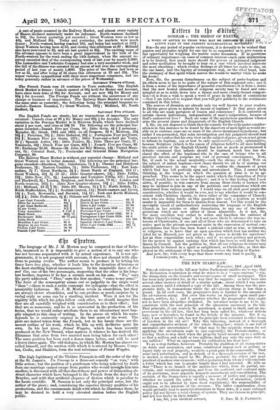Stn—In any period of popular excitement, it is devoutly to
be wished that passion and prejudice might for one day be so suspended as to give reason a fairo:..zaorrt5mnty for weighing the matter under discussion. If in questions of importance—in cases of common interest—such calm deliberation is to be desired, much more should the powers of unbiassed judgment and sober meditation be brought to bear on a cow, which involves interests the most absorbing ; which evokes feelings at all times too ready to rise, on the one hand, into the bigotry. of intemperate zeal, on the other hand, into the obstinacy of that spirit which nerves the would-be martyr while he seeks his doom !
Now, Sir, the present disturbances on the subject of pafdo-leptism and tta effects seem to me to be quite of the nature of this supposed ease; and it is from a sense of the importance of peaeeful conciliation—it is from a desire that the now heated elements of religious society may be fused and com- mingled so as to settle down into a firmer and more closely-bound composi- tion—it is from a wish to speak a word of peace in the midst of contentious —that I am induced to request that you will give publicity to the sentiments contained in this letter.
The sources of disunion are already only too well known to your readers. Is Divine grace given to infants by means of baptism ? Is that grace given to all who are made partakers of reason and conscience ? Is it conferred on certain -chosen individuals, independently of man's cooperation, because of God's undeserved love ? Such are some of the mysterious questions whence arise the present alarm and disquietude of the English Church.
I, Sir, am not disposed to think that the remedy for the evils under consider- ation is in this instance to be found by the discovery of auchlight as would en- able us to embrace some one or more of the above-mentioned hypotheses; but rather I am persuaded, that calm investigation and fair judgment should lead each man to confess that his own view on the subjectofgrace, pruner not given to infants in baptism, can at best be only optntonative,—only opinionative, because Scripture (which is the canon of religious behef to all men holding the sixth article of the English Church) has not so much as pronounced a definite command that infants should be baptised, much less has de- clared the effect of the baptismal rite in the case of beings who to all practical intents and purposes are void of personal consciousness. Now, Sir, if such be the actual neutrality—such the silence of Holy Writ on the subject of infant baptism—how chary should we all be of making our fallible inferences in any way close, or confine the channels of grace which God has left perfectly open and unrestrained. This, I cannot help thin, is the temper in which the question at issue is to be ep- proalinZ. This seems to be the aspect under which the Committee of Privy Council would have us view the subject ; and it is to this feeling that I now strive, if possible, to win converts from among those clerks or laymen who may be inclined to join in any of the petitions and requisitions which are threatened from various quarters. I would urge on all such good people the consideration whether it would be wise, not to say whether it would be con- sistent with 'Chihli:ion charity, to force either of the companies of Church- men who are doing battle on this question into such a position as would render it impossible for them to abstain from dissent. Yet this would be the inevitable result of authoritatively restricting the language of the English Church in her articles or other formularies, to any one of the inter- pretations which are now either of them admissible. Is it not, Sir, the more excellent way rather to widen and lengthen the embrace of Mother Church's loving arms? Is it not more likely to advance the true in- terests of -Christianity, if one and all of -those who are determined to take an attire part in the present movement unite in the expression of mutual con- gratulations that there has been found a judicial court so svise, so tolerant, so religious, as to leave that ama open question which God has -neither de- cided for us Himself, nor yet given us We power to decide for ourselves ? Let us thus congratulate each other ; and if we must petition and protest, let the protest be against undoing that which has been so well done by the Queen in Council. Let the petition be that all our religious decisions may henceforth be formed in a spirit as pnlightened, as Christ-like, as that dis- played in the settlement of the Ca80 Gorham versus the Bishop of Exeter. And now, Sir, with every hope that these words may tend to pacifyy,


























 Previous page
Previous page